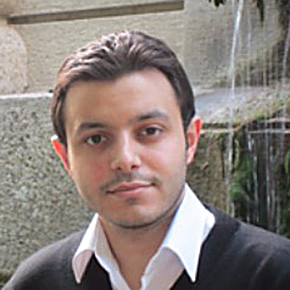The Excitement of Converting Ideas into Applications
Interview with IdeaConnection solver Mohamad Hadla By Paul Arnold
IdeaConnection problem solver Mohamad Hadla is a multilingual research scientist working on molecular biology techniques for clinical application and improving drug delivery systems. He has a PhD in molecular and cellular pharmacology and a Masters in molecular biology and genetics. Several years ago, he was searching for an online platform where he could put his knowledge and experience to good use, and came across IdeaConnection.
In this interview, Mohamad talks about the experience of being a member of problem solving teams, the success he has enjoyed in coming up with brilliant solutions and some of the challenges he's worked on.
 One of the challenges was to find a protocol to increase the germination of a plant species. After applying the protocol the seeker was able to increase the germination rate of the seeds, and we won a partial award.
One of the challenges was to find a protocol to increase the germination of a plant species. After applying the protocol the seeker was able to increase the germination rate of the seeds, and we won a partial award.There was another challenge where the seeker was searching for researchers to make a database of chemical compounds. This should have all of the physical-chemical features, the bio distribution, and the half lifetime and so on.
You work in medical genetics, but I wonder if the plant work you've done with IdeaConnection is a stretch intellectually.
Let me tell you what I think at the beginning of the project. I think, OK I am a biologist, and this is plant biology. When I saw the project I realized that this is what they teach you in university. For example, they teach you that biology doesn't have rules, but you have phenomena. So, with the team I was able to summarize all the data and think logically about how the biological phenomena works. Once we collected all the data and papers we saw that you have high impact correlation with the plant in order to increase the germination rate of the seeds. And when we sent the solution I was pretty sure that it would work. The seeker was pretty impressed.
Tell me about your experience of working on a remote problem solving team with people from different backgrounds and disciplines.
Overall, it’s good, but it can be difficult in the beginning. For example, the collection of compounds project was tricky at first because we were all seeing it from different sides. Someone was interested in the function, I was interested in the compound and someone else was interested in the application. So at the beginning, it's not always easy to have chemistry between the team members. However, the facilitator then steps in to make it more comfortable for everyone to understand each other in order to have the best solution. The main thing should be the dynamic between the team members because this will make a big difference when it comes to coming up with solutions.
What are your motives for participating in challenges? Is it to solve something because it's there, a learning experience or a way to get extra money?
I think it is a mix of all of those. But the most exciting reason for me is to see that I am a member of a team that converts an idea into an application. This is the most exciting thing for any researcher in my opinion. It is being able to share my knowledge and my experience with someone who is then able to apply my skills and knowledge. So, I am not just writing papers and having theories, I am able to see the result of my ideas as applications. Once I heard something at a conference that was very impressive. They said when you convert data to money this is innovation.
What does it feel like when you have arrived at a great solution, and then later the seeker accepts it?
When I was part of one particular challenge team I proposed my own solution and one team member proposed another. But then we mixed both of them and sent it to the seeker as a team solution that we believed in. This is the main thing. You have to believe in what you are presenting because if you don’t have faith in it the seeker will see that you are not sure about what you present. When we sent our solution we were pretty sure it would work because we collected very interesting data. But the best moment was when we received the response from the seeker that it works. I was excited. I was happy. Besides the money, I was happy to see we were able to think logically to apply the science behind the project.
